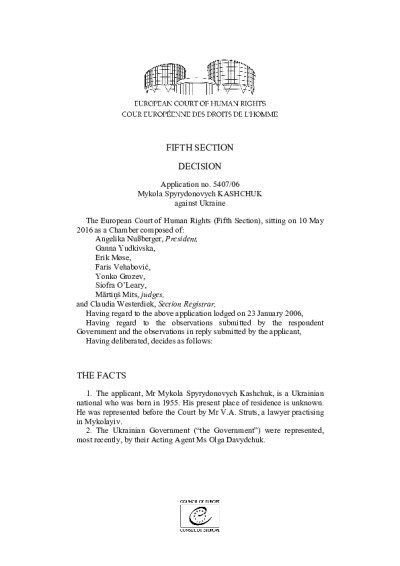
Date
Geographical Area
Europe
Countries
Ukraine
Keywords
Jurisdiction
European Court of Human Rights (ECHR)
Case Name
Kashchuk v Ukraine
Case Reference
Application no. 5407/06
Name of Court
European Court of Human Rights
Key Facts
The applicant owned a house in a village in the Mykolayiv region where he lived with his wife and two children. In February 1996, the village suffered considerable flooding. The Executive Committee of Mykolayiv City issued an order noting thirty-seven residential houses in the village were flooded and twenty-seven of those were at risk of collapsing. The local authorities recommended that the applicant contact his employer, the “Equator Plant” to resolve his housing problem. The Council then delivered a decision on resettlement of the residents of the flooded houses, including the applicant’s family.
Difficulties arose in relation to the resettlement of the applicant’s family. The applicant noted the flat offered consisted of one room and did not have adequate facilities for his family. He was then placed on a waiting list. In 2002, the applicant brought a civil claim against the Equator Plant. The Zavodskyy District Court of Mykolayiv found against the applicant holding that the damage caused by the flooding in 1996 was not the main cause of the poor condition of the property. Following a series of legal cases, on 11 April 2006 the Supreme Court rejected the applicant’s appeal, giving a concise reasoning that it had not discerned any violations of the law.
The applicant complained alleging a violation under Article 6(1) ECHR that the domestic proceedings had been unfair. He also complained under Article 8 of a breach of his right to respect for his home, and under Article 13 of a lack of an effective domestic remedy.
Difficulties arose in relation to the resettlement of the applicant’s family. The applicant noted the flat offered consisted of one room and did not have adequate facilities for his family. He was then placed on a waiting list. In 2002, the applicant brought a civil claim against the Equator Plant. The Zavodskyy District Court of Mykolayiv found against the applicant holding that the damage caused by the flooding in 1996 was not the main cause of the poor condition of the property. Following a series of legal cases, on 11 April 2006 the Supreme Court rejected the applicant’s appeal, giving a concise reasoning that it had not discerned any violations of the law.
The applicant complained alleging a violation under Article 6(1) ECHR that the domestic proceedings had been unfair. He also complained under Article 8 of a breach of his right to respect for his home, and under Article 13 of a lack of an effective domestic remedy.
Decision and Reasoning
The Court rejected the allegations of violations under Articles 6(1), 8 and 13 for different of factual and technical reasons. Regarding Article 6(1), the Court found no indication of arbitrariness or bad faith in the domestic courts’ factual and legal assessment of the applicant’s case. The Court noted that it was clear from a technical survey conducted in April 1996 that his house had been in a very poor condition prior to the flood. Accordingly, the domestic court’s conclusion that the applicant could only claim free accommodation due to his status as a person living in an uninhabitable house, rather than as a victim of a natural disaster entitled to further privileges, was not unreasonable.
Outcome
The Court declared the application manifestly unfounded and therefore inadmissible in regards to all three alleged violations.
Link
Disclaimer
This case law summary was developed as part of the Disaster Law Database (DISLAW) project, and is not an official record of the case.
Document
Document